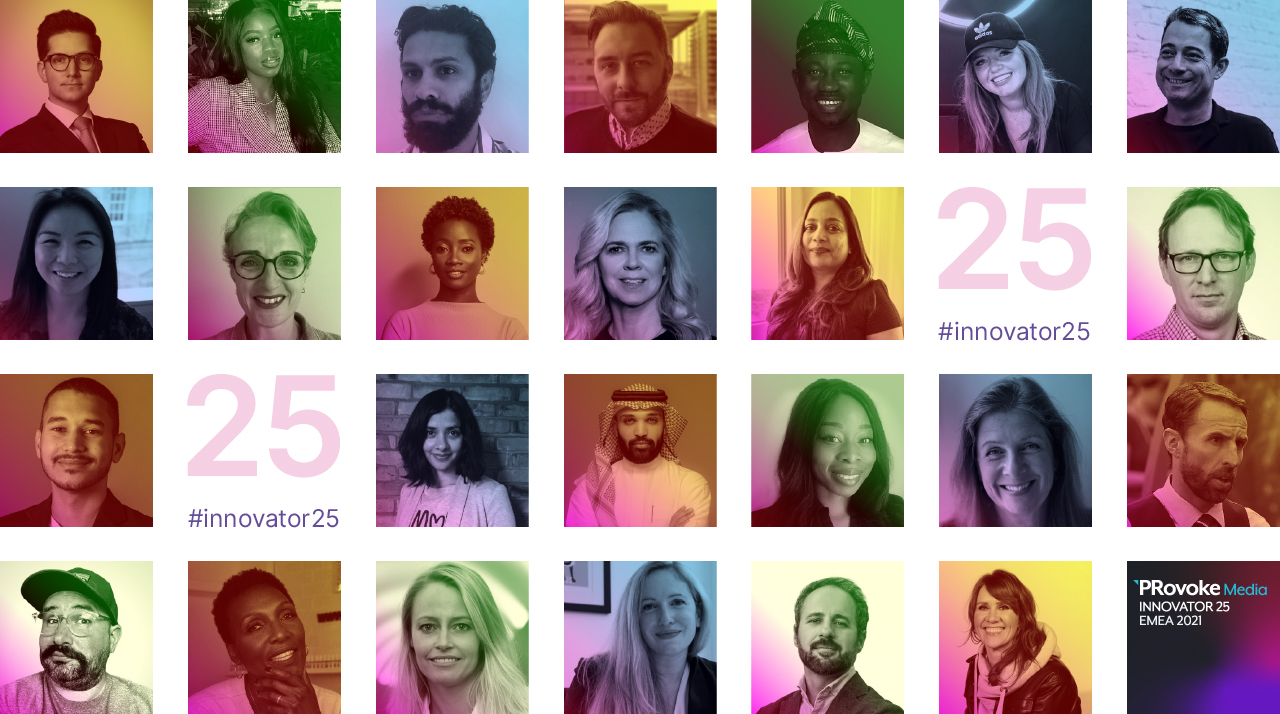
 Podcasts
PodcastsCatch the latest PR news & updates with PRovoke Media's PR Podcasts. Lifting the lid on key industry stories & trends, join our listeners of PR podcasts today.
 Videos
VideosLatest video interviews and campaigns from PRovoke Media, previously known as the Holmes Report.
Long-form journalism that analyzes the issues, challenges and opportunities facing the business and practice of PR.
 Profiles & Interviews
Profiles & InterviewsExplore PR profiles and interviews with leaders from the marketing and PR worlds.
 Crisis Review
Crisis ReviewPR Crisis & Business Crisis review. PRovoke Media's annual analysis of the top reputation crises to rock the corporate sector. Read on here.
 Coronavirus
CoronavirusPRovoke Media's coverage of the Covid-19 crisis, focusing on corporate communication, public affairs & PR industry fallout.
 Trend Forecasts
Trend ForecastsPRovoke Media's PR Trends round up. PRovoke Media's annual forecast of PR trends and news that will impact the PR world in the year ahead...
 Social & Digital
Social & DigitalDedicated to exploring the new frontiers of PR as it dives deeper into social media, content and analytics.
 Technology
TechnologyOur coverage of key technology PR trends and challenges from around the world of digital communications.
 Consumer
ConsumerFrom brand marketing to conscious consumerism, coverage of key marketing and PR trends worldwide.
 Employee Engagement
Employee EngagementPRovoke Media's coverage, analysis and news around the rapidly-shifting area of employee engagement and internal communications.
 Sports Marketing
Sports Marketing Sports PR news, diversity & inclusion trends, views and analysis from PRovoke Media. Subscribe today for the very latest in the world of sports communications.
 Global PR Agency Rankings
Global PR Agency RankingsPRovoke Media's definitive global benchmark of global PR agency size and growth.
Enter PRovoke Media's 2024 Global 250 Agency Ranking and/or our Agencies of the Year competitions now.
 Agencies of the Year
Agencies of the YearPRovoke Media's annual selections for PR Agencies of the Year, across all of the world's major markets.
 Innovator 25
Innovator 25PRovoke Media profiles marcomms innovators from across North America, EMEA and Asia-Pac.
 Creativity in PR
Creativity in PRIn-depth annual research into the PR industry's efforts to raise creative standards.
 Asia-Pacific Communication Index
Asia-Pacific Communication IndexAPACD/Ruder Finn annual study of Asia-Pacific in-house communications professionals.
 SABRE Awards
SABRE AwardsThe world's biggest PR awards programme, dedicated to benchmarking the best PR work from across the globe.
 PRovokeSummit Global
PRovokeSummit GlobalThe biggest PR conference of the year, a high-level forum designed to address the critical issues that matter most.
 PRovoke Media Regional Series
PRovoke Media Regional SeriesA global network of conferences that explore the innovation and disruption that is redefining public relations.
 Agencies of the Year
Agencies of the YearUnrivalled insight into the world's best PR agencies, across specialist and geographic categories.
 Roundtables
RoundtablesOur Roundtables bring together in-house comms leaders with PR firms to examine the future of communications.
 Agency Playbook
Agency PlaybookThe PR industry’s most comprehensive listing of firms from every region and specialty
.jpg) All Jobs
All JobsFind the latest global PR and communications jobs from PRovoke Media. From internships to account executives or directors. See all our PR jobs here.
PRovoke Media's editorial series published in collaboration with partners.

As activist at heart, Sudha Singh is the founder of The Purpose Room, a virtual consultancy working at the intersection of organisational purpose, inclusion and business sustainability. She has over 30 years’ experience advising the C-suites of multinationals, governments, industry associations and NGOs across geographies including UK and India. Her expertise lies in building robust partnerships to deliver unique integrated reputation campaigns, managing complex thought leadership and crisis projects. She has advised clients faced with regulatory, political and environmental challenges as well as those facing union and civil society activism. Passionate about driving change in the industry for diverse people and women, Singh is a certified diversity trainer, advising clients on creating measurable frameworks for organisational change including culture change and diversity in leadership. She is also the co-chair of the PRCA Ethnicity & Inclusion Advisory Council and a founding member of PRCA Race and Ethnicity Equity Board (REEB). And as if all that doesn’t keep her busy enough, Singh hosts The Elephant in the Room podcast, amplifying the voices of diverse people on topics including systemic and institutionalised racism, casteism, discrimination, poverty, mental health and climate change.
How would you describe the communications/PR industry's level of innovation compared to other marketing disciplines?
Less innovative.
Do you think the global pandemic has made the industry more innovative?
The pandemic has definitely made the industry more innovative. The function is in demand and practitioners have risen to the challenges of the biggest societal conflicts of our time, the seismic shifts in how we live and work due to the pandemic. We have had to adapt to how we engage with internal and external stakeholders, how we speak to them, what platforms we use, and most importantly how we are able to embed authenticity in everything we do. That has required opening our minds, being creative/innovative and agile.
Where is the PR industry's greatest opportunity for taking the lead on innovation?
After DE&I my top would be on team and account management including working practices – specifically how the industry is going to be create a thriving future ready workplace.
Who most influences how innovative a brand's engagement is?
CMO.
How do you define innovation?
According to me innovation is an idea, a process, or a reinvention that helps an organisation address a customer problem; or an internal problem and is a competitive advantage. Ideally it should help you do better. All innovations does not require big investment, but for innovation to flourish you do need a culture that promotes risk taking, celebrates failure and promotes collaboration. The best ideas and innovations happen when an organisation has diversity of thought and embeds inclusion in its very fabric.
What is the most innovative comms/marketing initiative you've seen in the last 12 months?
The last 18 months have been great for innovation in our industry. With society being in a constant state of flux, agencies and organisations have had to be agile and adapt constantly to be able to continue to be relevant internally and externally. Some of the biggest innovations in the last 12 months have been around behaviour change and outreach to people impacted by Covid. In the UK, the government tackling the misinformation campaign was great; Save the Children: Justice for Rohingya Children campaign; the campaigns by Joeli Brearley of Pregnant then Screwed; many donor organisations came up with innovative approaches to servicing their communities during Covid-19 including virtual fundraising etc.
In your opinion, what brands and/or agencies are most innovative around PR and marketing?
Zoom, IKEA, Patagonia, Dove, Deliveroo, Pret with their coffee subscriptions, Heinz Beans with their magic breakfast donations.
Describe a moment in your career that you would consider 'innovative.'
In a career as long as mine, there have been several innovative moments. And most innovations have been a result of collaboration across different functions. More recently, the moment I consider most innovative was when I set up my consultancy, The Purpose Room, that works at the intersection of organisational purpose, inclusion and sustainability. These three foundational pillars of an organisation are intrinsically linked to an organisations reputation or license to operate and building a better society. I also consider my podcast The Elephant in the Room an innovation, because it allows me to collaborate and learn every single day from wonderful people from across the world. The Elephant in the Room is a platform for people who are interested in building a fairer society.
Who do you admire for his/her approach to innovation?
There are many many people who I admire greatly; mostly they are outside the industry. I am a big fan of Ekpedeme “Pamay” M. Bassey, chief learning and diversity officer for the Kraft Heinz Company and TEDx Speaker. I am also inspired by a number of start ups in our industry in the last 18 months, particularly on how they have designed their offerings.
How do you get out of a creativity rut?
Generally, by stopping what I am trying to do; moving away from my desk and spending the next half an hour/hour reading what I like, going for a walk while listening to my favourite podcasts or cooking if I am at home. Sometimes when I have the time, I will talk to people for inspiration.
What advice would you give to the PR industry around embracing innovation?
Our discipline still suffers from negative perception. Senior practitioners are often unable to take a stand or disagree with clients on spin or low-level tactical work. The last 18 months have raised the profile of comms and we are in the C-suite. In order to be innovative, practitioners need to understand about the mega trends, changing consumer behaviours, technology and media. It requires us to be well informed; perhaps introduce lateral hiring into the industry from other sectors to inject creative thinking and last but not the least don't sit in a discussion/planning meeting with a homogenous group of people.
What would you be doing if you weren't doing your current job?
I would have been an activist journalist working for the International Consortium of Investigative Journalists, if not covering geopolitics in the Middle East.
Which book/movie/TV show/podcast/playlist/other cultural source has helped you get through this year or provided inspiration?
I am a big fan of reading. In the last 18 months I have read voraciously, fiction has taken a back seat. My favourites would be: Gary Younge: Who we are; Satnam Sanghera: Empireland; Ibram X Kendi: Four Hundred Souls; Isabel Wilkerson: Caste; Atul Gawande: The Checklist Manifesto; HBR Guide for Women at Work. My own podcast The Elephant in the Room has helped me to stay motivated from one week to the next. Another favourite is 'Land of the Giants' from Recode and Vox Media Podcast Network. Unfortunately, I did not watch as much TV because I seem to fall down a rabbit hole when trying to identify good shows from the millions available today.
What's your favourite time of day and why?
If I am allowed to have two, it is the start and end of the day. I love the end of the day routine where I am mentally reviewing my day, catching up with the kids if they are around and picking up my book for the day. I wouldn't call myself a morning person but I love starting off my day with a to-do-list, it makes me feel I can work my way through any challenge. It helps me plan my day, get motivated by what I have to look forward to and achieve.







Intelligence and insight from across the PR world.
About PRovoke Media Contact Us Privacy & Cookie PolicyWe feel that the views of the reader are as important as the views of the writer. Please contact us at [email protected]
Signup For Our Newsletter Media Kits/Editorial Calendar Jobs Postings A-Z News Sitemap© Holmes Report LLC 2024